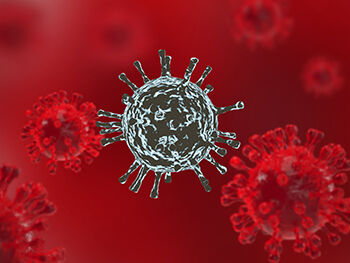University News Last updated 03 December 2021

A little caution and some common sense steps are the key to help slow the spread of the new omicron COVID variant and keep Christmas on track, according to a specialist in viruses and immunology.
Dr Tara Hurst, a lecturer in biomedical sciences at Birmingham City University and author of articles on COVID vaccines and variants, suggests that there are ways we can reduce our risk of catching the disease and prevent festive party plans being spoiled.
With the government having recently introduced measures to tackle the omicron variant – including the reintroduction of compulsory mask wearing and an expansion of the booster vaccination rollout programme – as it stands there are currently no plans to return to the restrictions that were placed on households last Christmas.
Prime Minister Boris Johnson, who has been criticised for allegedly breaking his own rules with parties at Downing Street last December, has stated that there is no need to call off this year’s Christmas party plans.
But the likelihood of the return of bigger in-person parties risks an increase in the chances of infection. UK Health Security Agency chief and former Deputy Chief Medical Officer for England, Dr Jenny Harries, recently suggested that people cut down their social contact over the festive period to help curb transmission of the new variant.
While Tara agrees that we should all be on our guard against COVID, and in particular the omicron strain, she suggests some common sense steps and self-imposed COVID precautions – in addition to following national guidance – should mean that the season’s celebrations needn’t be cancelled.
Tara said:
“That’s not to say we can be complacent though. We know that in whatever form it takes, COVID isn’t going away so it falls on all of us to pay heed to the rules. But we can also impose our own, simple common sense steps to minimise the chances of getting infected or infecting others, and make sure that we can enjoy the festive fun this year.”
Her top tips for achieving a COVID-free Christmas are:
Book that booster jab
Vaccines reduce both the severity of COVID and the chance of transmissions. Vaccination has so far significantly reduced hospitalisations and deaths due to COVID-19. According to the Office for National Statistics (ONS), age-standardised mortality due to COIVD-19 is 32 times greater in those who are unvaccinated. However, the evidence also supports a gradual waning of protection over time and a campaign of providing booster shots is already underway. So everyone who can should get the first, second and booster dose.
Sanitise for Santa
Hands transfer germs so it’s important to keep practicing good hygiene habits of regular and thorough hand washing to help prevent infection.
Stick to six for the Christmas dinner
After vaccinations, cutting down contact with others and keeping socially distanced is the most effective way of stopping the spread of COVID. Christmas parties are not forbidden this year but smaller gatherings would be best. Therefore, if possible, stick to the rule of six for Christmas dinner and try to keep contact with others to a minimum.
“That might mean passing on pass the parcel and other party games”, Tara said. “Although, that won’t be such an issue if people follow the hand washing rules above!”
Get some air or go alfresco
As COVID is an airborne virus it’s particularly potent in confined, closed spaces so it’s important to keep indoor rooms ventilated. “Ideally, I’d actually suggest having an outdoor dinner, which is a good excuse for hot chocolate and mulled wine but it would be wise to open the windows if you’re having Christmas indoors,” advises Tara. “I know it can be chilly at this time of year but with the heat from all that cooking you’ll probably welcome a bit of fresh air anyway, especially if you’re wearing your Christmas jumper.”
Miss out on the mistletoe
COVID can be present in saliva so Tara’s final piece of advice for partygoers this festive season is to skip the mistletoe unless it’s among couples already closely acquainted. “Air kisses are absolutely fine for everyone else,” she said.